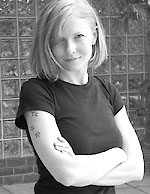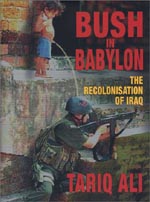Beyond Himself
Jonathan Safran Foer's unconscious grasp of the Jewish literary tradition
By Roger Gathman, Fri., Nov. 15, 2002

Alexander Perchov, the malapropian Ukrainian travel guide and faux world-class cocksman in Jonathan Safran Foer's Everything Is Illuminated, has the outsized, comic dimension of a character who grows bigger than his story. This happens. It happened to Shakespeare with Falstaff in Henry IV, part whatever. It happened to John Kennedy Toole with Ignatius J. Reilly in A Confederacy of Dunces. Foer, too, seems to have plugged into an energy source that carried him beyond himself. After all, how can you resist a character who introduces himself like this?
"My legal name is Alexander Perchov. But all of my many friends dub me Alex, because that is a more flaccid-to-utter version of my legal name."
But it would be a shame to reduce a novel this intricate to Alex's crazy penchant for the thesaurus. This many-layered novel, the 24-year-old Foer's first, features another character, dubbed the "hero" by Alex himself, who is none other than the author. The premise is that Jonathan has hired Alex and his grandfather (and, unwittingly, their blind and smelly bitch, Sammy Davis Junior, Junior) to guide him about the Ukrainian countryside in search of Jonathan's ancestry. That ancestry goes back to a shtetl, the village of Trachimbrod. In alternate chapters we see Foer imagine the progress of the village, starting with its Chagallesque emergence in the 18th century to the machine-gunning of all the Fiddlers on the Roofs in 1942, when the Einsatzgruppe liquidated it with maximum brutality. The tone turns distinctly dark as we realize that this history isn't buried, nor are the collaborations and silences that allowed it.
A novel so seemingly saturated in Jewish literature would imply a like-minded writer. But Foer, in a phone interview, claims that he didn't start out with a great interest in family history. "I wasn't interested in Jewish things or history at large. I didn't think of myself as knowledgeable about Jewish things." Even the surface resemblance between the everyday surrealism of Trachimbrod and Bruno Schultz's work came about by chance. "I read Bruno Schultz after I finished the book. I think I'd been fed this in ways I wasn't aware of. I went to Hebrew school. I guess I heard my family at the table."
Foer comes from the D.C. professional class. His mother is in public relations, and his father works for himself in the slightly quixotic cause of antitrust -- "he started something called the Antitrust Institute." When he went to Princeton, he took a writing course with Joyce Carol Oates. It was Oates to whom he showed a draft he'd written about a trip he made to the Ukraine one summer on a grant from Princeton.
"I decided to take this trip as if I were interested in Jewish history. This required getting the money from Princeton and getting a translator, just like in the book, although I never met any Alex. Then, in Prague, I started it. I didn't plan on this book. I started writing Alex, and he cracked me up. I tested each sentence against the way I reacted -- did I think it was funny? Did I think it was beautiful or moving? I wasn't conscious of working within a Jewish tradition, but when I made a funny joke, I found myself telling a Jewish joke, and when I told a beautiful story, it turned out to be a Jewish story."
The back-story of the publication of Foer's novel is so redolent of the great American folktale of sudden discovery and stardom that a little too much attention has been paid to such things as the size of his advance and the reader response to the first chapter of the novel, published in The New Yorker. It was that response which indicated that Houghton Mifflin would have a hit on their hands. Foer is low-key about the mechanics of "being discovered." When he returned to Princeton and showed Oates the draft, she liked it. "She made a lot of suggestions." But he didn't ask her about publishing it, and he went on to graduate with a degree in philosophy even though he "had absolutely zero interest in going to grad school.
"I wasn't all that ambitious. I kept the manuscript in a drawer for two years. I had a lot of jobs. I researched agents on the Internet, sent it to two agents, and it all worked out very fortuitously. I was working as a receptionist when the book was sold."
This year, Foer has become a fixture in the suddenly burgeoning world of Jewish book fairs. Publishers Weekly reports that he is touring 25 of them this year. But Foer is uncomfortable with being asked about Jewish culture as though he represented it, or identifying himself with a Jewish school of writing. "I don't think that's how fiction works," he claims. "Writers who write about what they have to write about are much more interesting." ![]()
Jonathan Safran Foer will join Nicole Krauss (Man Walks Into a Room) for an Austin Jewish Book Fair appearance at 7:30pm, Monday, Nov. 18, at the Jewish Community Association of Austin. The event is free and open to the public. For more information, check www.jcaaonline.org.
Also This Week --
Rubén Martínez at Resistencia Book Store, 7:30pm, Wednesday, Nov. 20 (both this appearance and Martínez's Crossing Over: A Mexican Family on the Migrant Trail are highly recommended)
Adult Spelling Bee, put on by the Chronicle, 107.7 The End, and Fadó, 7pm, Thursday, Nov. 21, at the pub, with all proceeds benefiting Literacy Austin (see p.25 for more information; it's a far, far cry from last year's Boggle of the Bands, but it should be quite a time nonetheless)








